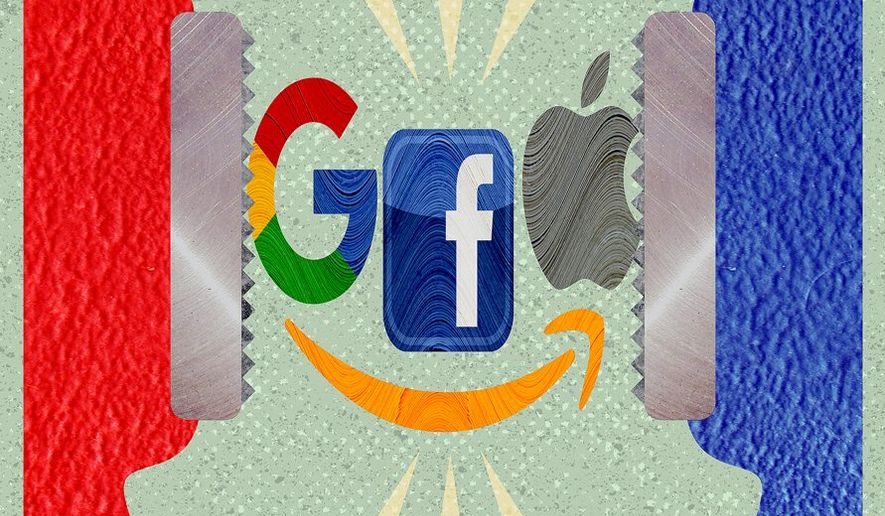OPINION:
The pandemic has demonstrated the critical value that technology companies and online platforms provide to all Americans.
For most small businesses that have managed to grind it out in the COVID-19 economy, technology platforms have been essential to survival and key to “pivoting” to new models that have kept revenues flowing. This positive private-sector dynamic needs to be encouraged by lawmakers and regulators at all levels of government. Instead, the opposite is occurring.
A lot of energy in Congress is being devoted to piling on “big tech” and ways to break up the online platforms that are keeping small businesses afloat and new entrepreneurs excited about launching successful enterprises. I am sure this scenario is exactly what our global competitors would love to see happen, outside of and including those that are already working to exact their pound of financial flesh from U.S. tech companies via taxes and/or regulatory action.
This week, the House Judiciary Committee will continue its work from the last Congress as it kicks off a series of hearings on big tech, with the first one focused on “Reviving Competition” where “gatekeeper power” and “barriers to entry” are the topics. This is quite interesting, as a quick look at the latest activity in new business applications shows that both the competitive and entrepreneurial spirit are alive and well, especially in the retail sector – and largely, I would argue, due to the benefits and accessibility of technology and online platforms.
Either out of necessity or opportunity, many Americans have taken the first step in starting a business: 2020 smashed expectations for new business applications — totaling 4.5 million, which was 24.3% higher than 2019.
For those claiming retail is dead, that the big guys are crushing the aspirations and competitiveness of small retail-entrepreneurs, this simply is not the case. Business applications in the retail sector actually saw the biggest 2019 to 2020 jump in new applications — up 54%! Non-store retail trade applications (online and direct-to-consumer retailers) increased 77%.
Investors have also caught onto the power of big tech — not in monopolizing markets or elbowing small brands out of platforms, but in their ability to catapult a small business brand from obscurity to a market leader in a relatively short period of time. As Retail Dive notes, “the potential for billion-dollar companies has grown and the speed at which they could become market leaders has increased.” Technology platforms help small businesses grow more quickly and strategically. When small business succeeds, so does the platform.
Given the deep jobs and business hole our economy is currently facing, startups and existing businesses need every opportunity to succeed, which includes having the appropriate tools and resources, as well as a friendly policy climate.
Over the past several years, regulatory certainty and better tax policy enabled an uptick in startup activity. Moreover, higher levels of consumer adoption in ecommerce and social media have allowed small businesses to do more with less and reach potential customers more effectively. The growth in the digital economy, along with the innovative tools and access to customers provided by big tech — represents an under-reported but outsized driver of this new startup activity.
For example, a September 2019 report on the digital economy produced by my organization found that small businesses saved nearly $163 billion annually due to the efficacy and effectiveness of online advertising. In addition, for startups, being able to more effectively reach potential customers through online advertising played a big factor in starting their businesses — 80% of entrepreneurs cited this as an important factor.
Regarding the importance of platforms and cloud services and the ability to pivot during the pandemic, a June 2020 SBE Council survey found 84% of small business owners reported that these tools were essential to the operation of their business, and 76% reported that these tools were critical to their survival during the COVID-19 crisis.
The bottom line is that tech platforms and digital tools are helping small business owners pivot to new models and/or products and services, run their businesses virtually, market and sell their goods and services to larger audiences at a lower cost, and better communicate with customers and fulfill their orders. The size and scale of tech platforms help small businesses reach customers where they are, and in great numbers — which is online.
Before Congress moves hastily to disrupt an ecosystem that has been a lifesaver for many small businesses and is vital to the startup entrepreneur’s dream, lawmakers need to fully understand the broad implications of altering policies that have led to American technological superiority and leadership. Too much is at stake not to, especially as we work to dig out of the economic damage caused by COVID-19.
• Karen Kerrigan is president and CEO of the Small Business and Entrepreneurship Council.




Please read our comment policy before commenting.